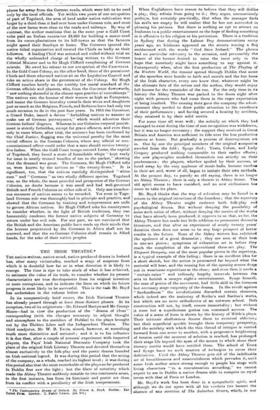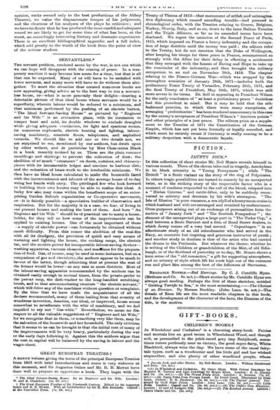THE IRISH THEATRE.*
TEE native-written, native-acted, native-produced drama in Ireland has, after many vicissitudes, reached a stage of suspense from which it is doubtful how far or in what direction it is likely to emerge. The time is ripe to take stock of what it has ae•hieved, to estimate the value of its work, to consider whether its present characteristics are true developments from its original intention or mere corruptions, and to indicate the lines on which its future progress is most likely to be successful. This is the task Mr. Boyd has undertaken in the volume before us.
In its comparatively brief career, the Irish National Theatre has already passed through at least three distinct phases. At its inception, two of its originators—Mr. Edward Martyn and Mr. George Moore—had in view the production of the drama of ideas" corresponding (with the changes necessary to adjust thought and atmosphere to the meridian of Dublin) to the plays brought out by the Thoittra Libre and the Independent Theatre. The third coadjutor, Mr. W. B. Yeats, aimed, however, at something muoh more distinctive and national ; and it is to his influence it is due that, after a couple of seasons' experiment with imported players, the Faye' Irish National Dramatic Company took the place of the original Irish Literary Theatre and devoted themselves almost exclusively to the folk-play and the poetic drama founded on Irish national legend. It was during this period that the acting of the company, as a whole, reached its highest level ; it was during this period also that the most remarkable of the plays so far produced in Dublin first saw the light ; but the blaze of notoriety which made the Abbey Theatre suddenly notable to two continents arose, in the first instance, less from its histrionic and poetic art than from its conflict with a peotilittrity of the Irish temperament.
• The Contemporary Drama of Ireland. ne Ernest A. Boyd. Dublin: The Talbot Press, Leaden. T. Fisher Unwia. tSs. nem When Englishmen have reason to believe that they will dislike a play, they refrain from going to it ; they argue, unconsciously perhales, but certainly practically, that when the manager finds his stalls are empty he will realize that he has not succeeded in pleasing his patrons. But there is nothing so apt to attract an Irishman to a public entertainment as the hope of finding something in it offensive to his religion or his patriotism. There is a tradition in Sydney that during the Labour Day demonstrations many years ago, an Irishman appeared on the streets waving a flag emblazoned with the words "God Save Ireland." The phrnss had no particular relevancy to the occasion, and presumably the bearer of the banner desired to raise the issue only in the hope that somebody might have something to say against it. Consequently when, after the first production of The Playboy of the 1Vestern Work?, the nimour spread through Dublin that some of the speeches were hostile to faith and morals and the fair fame of the Irish character, every one knew that, whatever might be the ultimate fate of the actors and the author, they would enjoy full houses for the remainder of the run. For the only time in its history the Abbey Theatre was packed to the doors night after night with persons who had come there in the eager expectation of being insulted. The ensuing riots gave the company the adver- tisement they needed to draw public attention to the excellence of their performance ; and having secured a hearing by accident, they retained it by their solid merits.
For some time all went well ; the subsidy on which they had managed to exist during the time of non-recognition was withdrawn, but it was no longer necessary ; the support they received in Great Britain and America was sufficient to tide over the less productive seasons at home. But gradually a process of disintegration set in. One by one the principal members of tho original companies seceded from the fold ; Synge died ; Yeats, Colum, and Lady Gregory produced nothing comparable to their earlier efforts ; the new playwrights modelled themselves too strictly on their predecessors ; the players, whether spoiled by their success, or lured away by the easy applause of music-halls, became enrolees in their art and, worst of all, began to imitate their Own methods. At the present day, to parody an old saying, there is no longer an Abbey Theatre ; there is only a theatre in Abbey Street. The old spirit seems to have vanished, and no new enthusiasm has come to take its place.
Mr. Boyd thinks that the way of salvation may be found in a return to the original intentions of the founders ; that the repertory of the Abbey Theatre might embrace both folk-play rind psychological drama. But without denying the possibility of some such union of effort, without denying the merits of the works that have already been produced, it appears to us that, so far, the Abbey Theatre has made but little addition to permanent drnmatie literature, and that after an experiment of nearly twenty years' duration there does not seem to be any large prospect of better results in the future. None of the Abbey writers has exhibited the opulence of a great dramatist ; they are seen at their best in one-act pieces ; symptoms of exhaustion set in before they reach the completion of the conventional three-act play. The Eloquent Dempsey, one of the most popular pieces in the repertory. is a typical example of this failing ; there is an excellent idea for a short sketch, but the action is protracted far beyond whet the material will bear, and the rousing fun of the opening scenes drags out in wearisome repetitions at the close; and even then it needs a " curtain-raiser " and tediously lengthy intervals between the acts to furnish a meagre night's entertainment. Synge himself. the man of genius of the movement, had little skill in the tiresome but necessary stage carpentry of the drama. In the revolt against " Sardoodleum " the revolutionists discarded certain elements, which indeed are the mainstay of Scribe's and Sardou's works, but which are no mere orthodoxies of an outworn school. Deft construction will not, by itself, ensure immortality ; but without it none but a superhuman genius can command success. The value of a sense of form is shown by the history of Wilde's plays. Their intrinsic shallowness dooms them to eventual oblivion; but their superficial sparkle brought them temporary prosperity. and the subtlety with which the thin thread of intrigue is carried forward from one scene to another, with a progressive heightening of tension until the moment of solution is reached, has prolonged their stage life beyond the span of the season to which alone their literary merits would have entitled them. The school of Yeats and Synge have no such masters of technqitte to cover their deficiencies. Until the Abbey Theatre gate rid of the iadefinable air of breathlessness and amateurishness which pervades it, until some Irish author arises strong enough to people his stage with living characters "in a concatenation according," we cannot expect to see in Dublin a native drama able to compete on equal terms with that of Paris or London.
Mr. Lloyd's work has been (lone in a sympathetic spirit, Ana although we do not agree with all hie verdicts (we lament the absence of any mention of The Suburban Groove, which, in our
opinion, ranks second only to the beat productions of the Abbey Theatre), we value the dispassionate temper of his judgments, and the clearness of his analyses of the plays he criticizes ; and we have no doubt that he has produced the most candid and adequate record we are likely to get for some time of what has been, at the worst, an exceedingly interesting literary rind dramatic experiment. There is an excellent bibliographical appendix and a full index, which add greatly to the worth of the book from the point of view of the serious student.







































 Previous page
Previous page